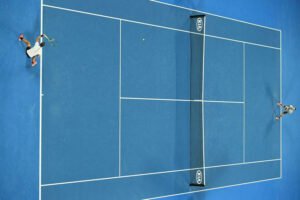How much does the mental factor influence the performance of tennis players?
It's known that just like the technical, tactical and physical aspects, the psychological aspect has an impact on the performance of athletes. But in what extent? To answer this question I will transport you to the Faculty of Psychology of the University of Buenos Aires. In the first class of the subject “Sports Psychology” the teacher asked that same question and asked us to respond with percentages. Several students answered that the mental part meant 10% of the game, others opted for 20% and some even dared to say that the psychological part covered 50%. The teacher surprisingly thought that for him the mental factor influenced performance by approximately 5%. It seems little, right? Many students look at the teacher confused. But the man explained that in athletes with similar physical, technical and tactical levels, that 5% is essential. It's what many times defines the result.
Weinberg and Gould, leaders and pioneers in the field of sports psychology, assure that often the psychological and emotional components overshadow and transcend the purely physical and technical aspects of execution. In any sport, the success or failure of a player comes from a combination of physical ability (for example: strenght, speed, balance, coordination) and psychological ability (for example: concentration, confidence, anxiety control).
I imagine that if you're reading this you have played tennis at some time, or you do it frequently. Have you ever competed against someone technically and physically far superior to you? If so, you'll have easily lost regardless of your mental strength. Because I regret to inform you that at very uneven technical and physical levels the mental factor has practically no influence on the result. If I play against Roger tomorrow, he's going to overtake me even though I'm totally focused and he's thinking about what he's going to give Mirka for her birthday.
Something very different happens when we play against someone of the same level as us. In this case, the mental factor takes on greater importance. Nerve control, motivation, confidence and concentration are some of the variables that I will develop in future articles. They're the ones who modify the destiny of the games. I don't know if the mental part will be 1%, 5% or 20%, it's very difficult to put it into numbers.But even if it's just 1%, in the third set tiebreak, it feels like a lot.
Weinberg,S. & Gould,D. (1996) Fundamentos de la psicología del deporte y el ejercicio físico. Barcelona: Ariel Psicología. Cap.13: “Introducción al entrenamiento de destrezas psicológicas”





